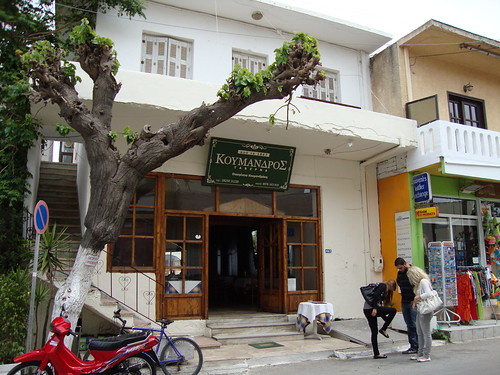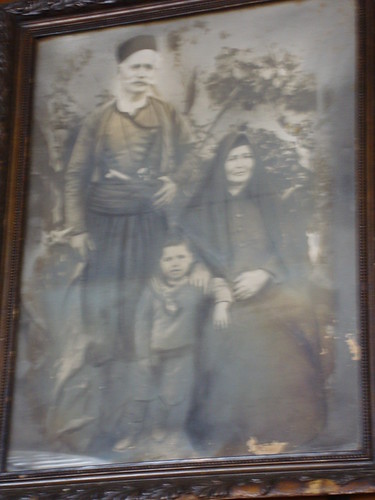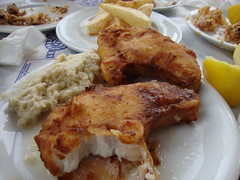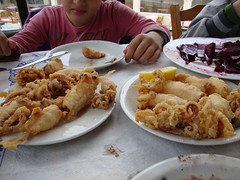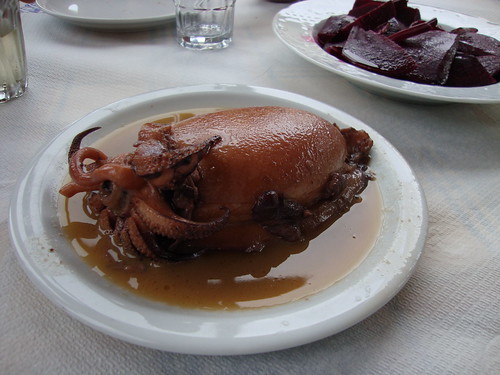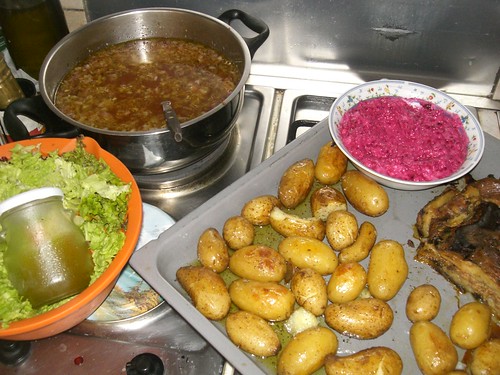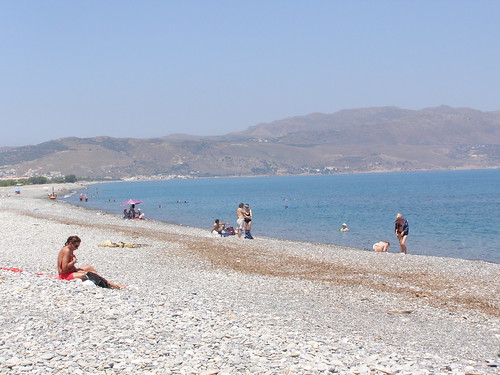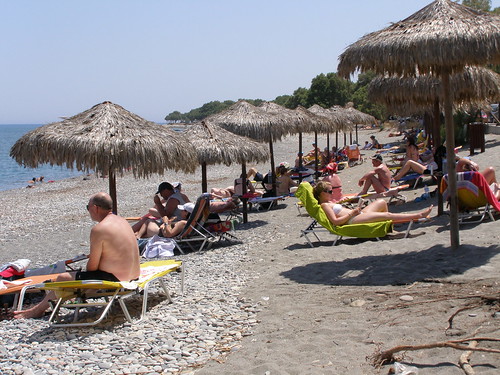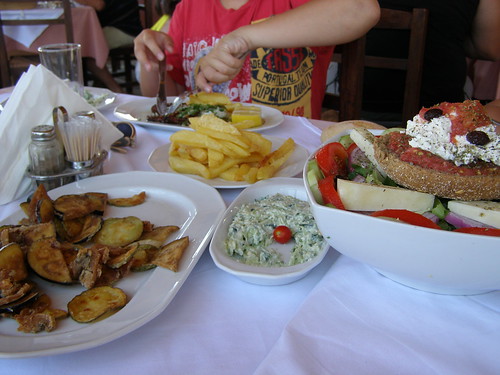The Akrotiri peninsula ('akrotiri' actually means 'peninsula') was once considered one of the most inhospitable places to live on the island. It was made famous by the setting of the film "Zorba the Greek" (1964), which captured well the desolate look of the area at the time: scrubby thorny plants covered most of the very rocky land, and virtually nothing more grew there, due to a lack of water source. As soon as the area received a regular water supply (40 or so years ago), it slowly underwent transformation. For a start, the shrubby land became covered in grapevines and olive groves. The value of the land increased in a very short space of time, and - poor villagers - became rich landowners practically overnight. The US maintains an army base in the area, many parts are now forested, giving it a lush green look, and the present landowners, often rich local business people, have built villas there (originally as εξοχικά, country retreats), giving the area a luxurious look.
Akrotiri is now treated as a suburb of Hania and is closely linked to the town via main arterial routes. It is well known in Hania as the best place to grow watermelon - something to do with the soil and microclimate. Most residents of the area are well off - there are very few old or badly maintained houses in Akrotiri - and everything looks big, new and luxurious. The beaches surrounding the rocky high peninsula offer some of the best swimming opportunities in Hania.


 |
Typical Akrotiri landscape today |

My kids' sports teams had organised an outing at a beach in the Akrotiri area as a fundraising event. The beach they chose - Loutraki, a lesser known beach compared to its neighbour, the tough and mighty Marathi - I had last visited only once before, about 12 years ago, and didn't like it very much. It was a little untidy and scraggly, with cramped seating space, located in a small protected bay flanked by a rocky coastline. It didn't have much more appeal than my local beach, although the sea looked cleaner. Loutraki used to be a very laidback family beach, with a sole canteen on the sand, which served souvlaki skewers, fried potatoes, packaged snacks and drinks.
 The rocky area has now been relandscaped on one side, housing a beach bar with a DJ, a casual restaurant, a formal restaurant, umbrellas and deck chairs (free to use by ordering something to eat/drink), all laid out on a grassy lawn. The scenery is quite stunning; it looks out onto an island situated in Souda harbour, and yachts can be seen sailing past every now and then. The colour of the very clean sea is a dazzling light blue, contrasting nicely with the lush green foliage of the area; edible wild greens *(notably rock samphire) can be seen growing abundantly among the very sharp rocks, and natural sea salt (the kind you pay a small fortune for to use in your cooking) collects in the littler craters. Sea urchins line the sea bed by the rocks. I even saw a sprig of a fig tree that had sprouted among the rocks with a fig on it!
The rocky area has now been relandscaped on one side, housing a beach bar with a DJ, a casual restaurant, a formal restaurant, umbrellas and deck chairs (free to use by ordering something to eat/drink), all laid out on a grassy lawn. The scenery is quite stunning; it looks out onto an island situated in Souda harbour, and yachts can be seen sailing past every now and then. The colour of the very clean sea is a dazzling light blue, contrasting nicely with the lush green foliage of the area; edible wild greens *(notably rock samphire) can be seen growing abundantly among the very sharp rocks, and natural sea salt (the kind you pay a small fortune for to use in your cooking) collects in the littler craters. Sea urchins line the sea bed by the rocks. I even saw a sprig of a fig tree that had sprouted among the rocks with a fig on it!




Loutraki beach is now divided up into two areas - the 'family' beach on the sand, which is still very cramped, but it has a lifeguard and first-aid station; and the upmarket tropical-looking beach bar area elevated above the rocks, with sun loungers all over the artificial lawn. Steps have been built to assist people in accessing the rock where they can go freefall swimming. The area is overrun by glamorous-looking people, mainly couples, slim tanned bodies and the latest fashion bikinis. Good-looking young uniformed waiters come to serve you. It is mainly frequented by Greek locals and Greek tourists (ie from the mainland), but there are also foreign tourists. You don't have to be rich to come here - using the deckchairs costs as much as a soda or coffee (something like 2-3 euro). Even if it is overpriced, you would still pay this price for a deckchair at other beaches, and if you add a coffee to those prices, it may end up costing you more. Hania has no pay-to-use beaches - this is as much as you will pay. Going to Loutraki is more of a class thing. There was a Jaguar sitting in the parking space near the restaurant area. I parked my tinny Hyundai next to it.

Since it was a Saturday, most of the sun loungers had been taken, but I was very lucky to find a set of two for me and my son, right by the waterfront, while my daughter sat with her friends from the basketball team (although yoyu could pick one up from the spares lying around the bar and plonk yourself anywhere in the general area). I felt a little awkward being here, but it was a nice experience. It gave me the chance to see how the other half lived.



 The distance between one set of sun loungers and the next was quite close - Greeks are mindful of their personal space around them, despite the close proximity they may find themselves in with their beighbours. But everything said is within earshot of other people. On my left was a very-much-in-love couple (a sexy blonde Russian woman and a tall dark Greek); on my right was a middle-aged foreign couple (they didn't talk much). I don't know who was sitting behind me, but they were definitely Greek, according to the conversation I overheard (remember, I wasn't eavesdropping - Greeks talk in public without considering who may be listening, as it is generally the case that people are talking all at the same time, so they have their own conversations to listen to and maintain):
The distance between one set of sun loungers and the next was quite close - Greeks are mindful of their personal space around them, despite the close proximity they may find themselves in with their beighbours. But everything said is within earshot of other people. On my left was a very-much-in-love couple (a sexy blonde Russian woman and a tall dark Greek); on my right was a middle-aged foreign couple (they didn't talk much). I don't know who was sitting behind me, but they were definitely Greek, according to the conversation I overheard (remember, I wasn't eavesdropping - Greeks talk in public without considering who may be listening, as it is generally the case that people are talking all at the same time, so they have their own conversations to listen to and maintain):



Clockwise from top left: rock samphire, sea salt, tiny fig tree, purslane.



First man: Hey, long time, no see! Where have you been hiding?
Second man: Oh, I'm at the tailend of a week of leave from the clinic. I'm due back on Monday.
First man: Have you been busy there?
Second man: Yeah, it's been really busy these days, mainly due to the tourist season. But I'm hoping to be seconded [what is known in Greek as απόσπαση] to a smaller clinic, somewhere on the islands [as the biggest island in Greece, we locals never feel like we are living on a typical 'glossy brochure'-type Greek island], hopefully Kastellorizo [population ~500]. There's a serious shortage of doctors on the smaller islands, most of the community clinics are under-staffed, and I'm really hoping I get a placement on one for September.
First man: Kastellorizo? That's a bit of a hole, isn't it? There isn't much to do there now, let alone the winter.
Second man: Oh, I'm not asking for a placement there in the winter, I just want to ride out the tourist season in a smaller place. I may get a position in Symi [population ~2500] instead of Kastellorizo.
First man: Symi's better in many respects. It's bigger, so there's more to do. Wouldn't you prefer to be there?
Second man: Oh, no, not at all! Kastellorizo has a proper medical centre, so you just take up your position there, there are other staff to cover you, so you don't feel under pressure. But in Symi, there's nothing organised to step into. You're on call the whole time, you may work throughout the whole day and get no sleep at night because you're on your own, and effectually on call 24/7. I really hope I get the Kastellorizo placement. It's like being on holiday down there. In Symi, you end up working the whole time.

I really hope this doctor gets given the Symi placement. The tax payer likes to know that they're getting value for money, especially these days when the state is unable to afford to pay most of its employees, let alone give them paid holidays. Don't ask me why the larger Symi is under-staffed while the smaller Kastellorizo is overstaffed - I'm just telling you what I heard. (Symi probably has to maintain a number of medical centres located in different areas, whereas Kastellorizo has only one.)
©All Rights Reserved/Organically cooked. No part of this blog may be reproduced and/or copied by any means without prior consent from Maria Verivaki.






















